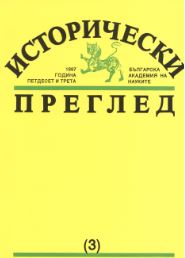Йеродякон Игнатий (Васил Левски) в Пловдив 1863–1864 г. (Нови документални следи около престоите му там)
Hierodeacon Ignatii (Vassil Levski) in Plovdiv 1863–1864 (New Documentary Evidence about His Stays There)
Author(s): Ognyana Mazhdrakova-ChavdarovaSubject(s): History, Political history, Modern Age, Special Historiographies:, 19th Century, The Ottoman Empire
Published by: Институт за исторически изследвания - Българска академия на науките
Keywords: Vassil Levski; Church Board of Wardens of the Plovdiv Bishopric; Legion in Belgrade;
Summary/Abstract: Owing to the scarcity of reliable historical evidence some important events in the life of young Vassil Levski are cursorily clarified in the literature. They include his stays already as hierodeacon in Plovdiv, the moment of his definitive orientation towards revolutionary activity, his giving up hierarchical service and the consequences of that. In the article are published a few short handwritten notes of 1864–1865, connected directly of indirectly with Vassil Levski (Hierodeacon Ignatii), discovered by the authoress in a ledger for entering the revenue and expenses of the Bulgarian Church Board of Wardens of the Plovdiv Bishopric. This instruction emerged in 1861 after Ilarion Makariopolski had proclaimed the separation of the Bulgarian Church form the Patriarchate of Constantinople. The leaders of the Church Board in Plovdiv tried, and as this ledger shows, succeeded in achieving real self-government of the Bulgarians of the bishopric in spiritual matters. Set against the background of these historical facts, in the article are examined and raised new questions concerning Levski’s spells in Plovdiv. The interpretation of the newly acquired documentary data from the ledger is difficult owing to their brevity and fragmentariness. For this reason in the article they are compared with the information from the known memoir sources, above all the recollections of Levski’s associate Hristo Ivanov-Golemiya. On the basis of the analysis made the authoress builds up her hypothesis and justifies the view that the self-government of the Bulgarians in an ecclesiastical respect made it possible for the Bulgarian Church Board in Plovdiv to give Vassil Levski decisive support in critical moments on two occasions. The first time in 1863 its leaders interceded before the Turkish authorities and obtained his release from prison where he had been thrown after his return from the Legion in Belgrade. The second time – in 1864 – they intervened so as to avoid a strict ecclesiastical-judicial sanction for the hieromonk who had.
Journal: Исторически преглед
- Issue Year: 1997
- Issue No: 3
- Page Range: 50-75
- Page Count: 26
- Language: Bulgarian
- Content File-PDF

